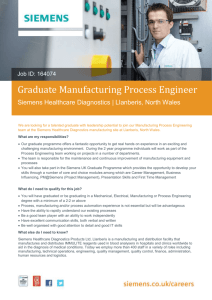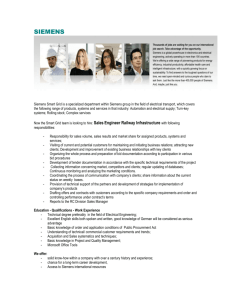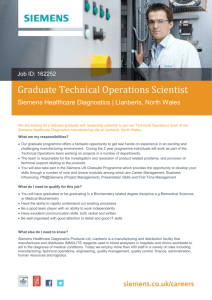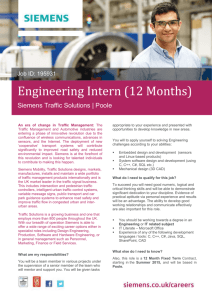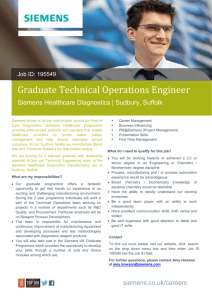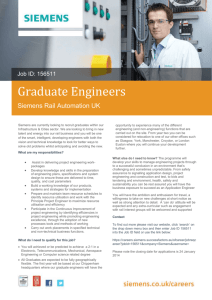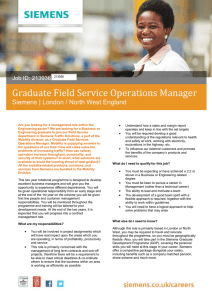A Big Brain for Power Plant Diagnostics
advertisement
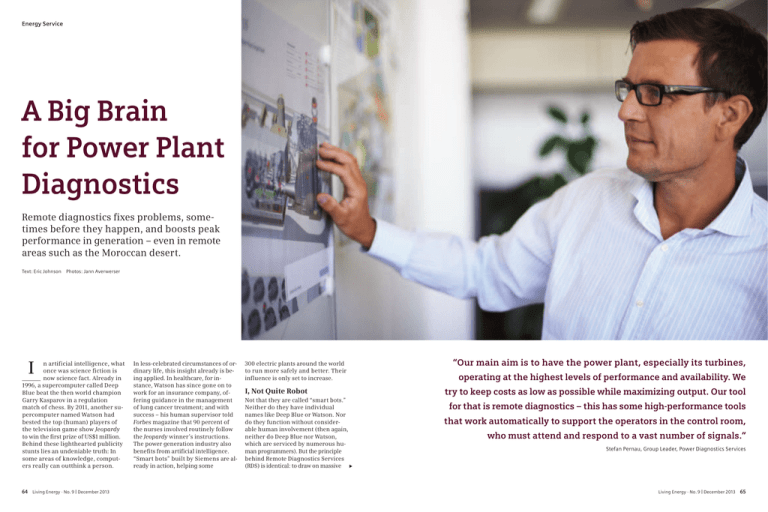
Energy Service xxxxx Kolumnentitel A Big Brain for Power Plant Diagnostics Remote diagnostics fixes problems, sometimes before they happen, and boosts peak performance in generation – even in remote areas such as the Moroccan desert. Text: Eric Johnson Photos: Jann Averwerser I n artificial intelligence, what once was science fiction is now science fact. Already in 1996, a supercomputer called Deep Blue beat the then world champion Garry Kasparov in a regulation match of chess. By 2011, another supercomputer named Watson had bested the top (human) players of the television game show Jeopardy to win the first prize of US$1 million. Behind these lighthearted publicity stunts lies an undeniable truth: In some areas of knowledge, computers really can outthink a person. 64 Living Energy · No. 9 | December 2013 In less-celebrated circumstances of ordinary life, this insight already is being applied. In healthcare, for instance, Watson has since gone on to work for an insurance company, offering guidance in the management of lung cancer treatment; and with success – his human supervisor told Forbes magazine that 90 percent of the nurses involved routinely follow the Jeopardy winner’s instructions. The power generation industry also benefits from artificial intelligence. “Smart bots” built by Siemens are already in action, helping some 300 electric plants around the world to run more safely and better. Their influence is only set to increase. I, Not Quite Robot Not that they are called “smart bots.” Neither do they have individual names like Deep Blue or Watson. Nor do they function without considerable human involvement (then again, neither do Deep Blue nor Watson, which are serviced by numerous human programmers). But the principle behind Remote Diagnostics Services (RDS) is identical: to draw on massive u “Our main aim is to have the power plant, especially its turbines, operating at the highest levels of performance and availability. We try to keep costs as low as possible while maximizing output. Our tool for that is remote diagnostics – this has some high-performance tools that work automatically to support the operators in the control room, who must attend and respond to a vast number of signals.” Stefan Pernau, Group Leader, Power Diagnostics Services Living Energy · No. 9 | December 2013 65 Energy Service Energy Service “If we have a problem, we can call on the whole of Siemens’ experience. Siemens is backing us with its entire company through RDS.” José Luis Pastor, CEO, Energy Electric of Tahaddart 66 Living Energy · No. 9 | December 2013 “RDS sees things at a says CEO José Luis Pastor of Moroccan power generator Energy Electric of Tahaddart. “So if we have a problem, we will have the whole of Siemens’ experience available to solve that problem. That gives me peace of mind. Siemens is backing us with its entire company through this RDS.” distance that our operator cannot see.” Glen Fallon, CEO of Siemens Plant Operations Tahaddart SARL Pickin’ Up Bad Vibrations Then the computer goes to work. Trends over time are identified and compared to the plant’s own history and to operating records of other, similar plants. In effect, the accumulated wisdom of Siemens is brought to bear to check the day’s work. This, Pernau points out, is far beyond what any operator (or person, for that matter) could be expected to do. Trends might be very subtle, such as a temperature creep in a certain unit of 0.1 °C every day for ten days straight, or a switch turning on milliseconds late. They might be fiendishly complex, requiring complicated algorithms or case-based reasoning to unravel. They also might be insignificant, just random fluctuations within an acceptable range. What RDS does is to sift and to sort the measurements, flag potential problems, and post those to a protected dashboard or expert system that the human teams consult when they show up for work in the morning. The Power Diagnostics people then take matters further, usually ordering up even more masses of data from the on-site recorder and starting discussions with on-site operators or expert colleagues throughout the Siemens network. Not many years ago, this remote analysis would have been impossible. Bandwidths were simply too narrow to accommodate the torrents of data now being funneled to Mülheim and Orlando. The knowledge base was too diffuse and undocumented, and the computing power required for such number crunching was not available. But now the right blocks are in place, and they just keep getting bigger and stronger. Customers have noticed. “I know that we are monitored from Germany,” Photo: Siemens amounts of data in order to enable better decisions. “Massive” is not an exaggeration. A typical generating plant looked after by Siemens Power Diagnostics, says Group Lead Stefan Pernau, records on the order of 100,000 measurements every day. It measures temperatures, pressures, revolutions, speeds, and timings at a level of detail that is far beyond the capacity of even the most experienced operator’s brain. Every day at midnight local time, a core dump of those measurements (not all of them – that is still too much to be transferred routinely) is delivered through the Internet, e.g., to Pernau’s team in Mülheim, Germany, or a mirror group located in Orlando, Florida, in the USA. With applications at Siemens ranging from wind turbines to medical scanners, RDS monitors many phenomena, but in nearly every field one stands front and center: vibration. This is a frequent harbinger of bad behavior, including the notorious “trip,” when a turbine shuts down completely. Modern turbines are so highly powered and finely tuned that they have little tolerance for outliers. “A small change in vibration conditions,” Pernau cautions, “can lead to massive problems.” The second most popular target for analysis, after vibration, is not a negative, but a positive. Operators are keen to see detailed analyses of thermodynamic process monitoring, better known to laypeople as “efficiency and performance.” This is the second aspect of RDS: not finding a problem to fix, but helping the best to get even better. With the help of deep computing, Power Diagnostics can try to identify which of the 100,000 conditions should be tweaked, and how, to get more output from the inputs, and to generate power exactly in accordance with specifications or even above. RDS also helps to “watch the watchers” by policing a power plant’s sensors. A recent example occurred in the RDS-connected plant at Tahaddart that is operated by Siemens personnel. Because two sensors had become waterlogged, they were erroneously signaling for the turbine to be shut down. However, RDS analysis suggested they were crying wolf. An on-site operator investigated, sorted out the problem, and averted a pointless shutdown. “RDS is able to look from a distance at things that our operator here can- Diagnostics – a Global Tool The principle of remote diagnostics – applying artificial intelligence to operations and maintenance – is not unique to the Siemens Energy Service Division, which has so far connected RDS to about 600 gas turbine and steam turbine units it monitors. The service is also offered to other Energy Service customers in oil & gas, industrial applications, and renewable power. Moreover, it’s part of the Siemens offering to customers of other businesses such as medical scanners and high-speed trains. Therefore, all those groups are clubbing together to craft a global tool, a common core of software that can be used to diagnose problems and performance company-wide. Called Advanced Diagnostic System (ADS), it is now in pilot testing with a broader debut expected in 2016. Drawing on knowledge from all of Siemens, it will be a big brain indeed. Remote Diagnostics Services (RDS) from Siemens help keeping power plants around the world up and running. Living Energy at not see,” says CEO Glen Fallon, “and give us advance warning of problems. We want to avoid unnecessary trips and outages that would cost money and power – which they really need in Morocco.” Obviously, RDS is not capable of fixing the problem itself, which shows the ongoing need for cooperation between man and machines. “Operators have absolutely critical jobs to do,” Pernau notes. “RDS is not at all about replacing them, but about helping them to do that job better than ever.” p Eric Johnson writes about technology, business, and the environment from Zurich. Formerly he headed what is now a Thomson Reuters bureau and corresponded for McGraw-Hill World News. Living Energy · No. 9 | December 2013 67
